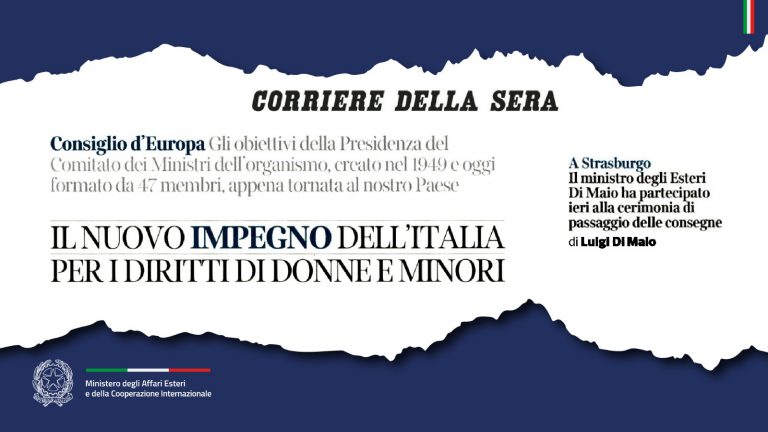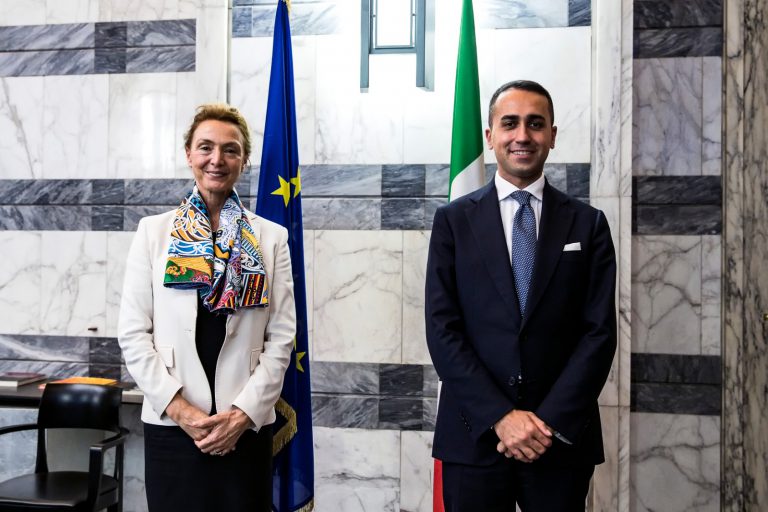(fa fede solo il testo effettivamente pronunciato)
Ladies and Gentlemen, distinguished Guests,
my warmest welcome to the Ministry of Foreign Affairs. I am particularly grateful to the President of ISPI, Ambassador Giancarlo Aragona, who will join us later today.
Shortly, we will listen to a video message by my Jordanian colleague, Foreign Minister Nasser Judeh. We co- presided the event on religious freedom in New York. Political commitments in Amman have kept him away, but he attaches the greatest importance to the issues we are going to approach today.
This workshop comes at the end of an intense year of meetings, initiatives and international negotiations. Italy has invested a lot in this process, in the firm conviction that freedom of religion influences the identity of the human being, and that religious harmony is essential for a stable and peaceful world.
Media, think-tanks and academia have a key role in the promotion of this freedom. This principle was clearly stated in New York last September, at a side event of the 67th General Assembly, which Italy co-chaired with Jordan. On that occasion, we also focused on two other crucial players: NGOs and Associations. On December 20th, our efforts were rewarded: the General Assembly adopted by consensus two Resolutions on freedom of religion or belief, proposed by the European Union and the Organisation for Islamic Cooperation.
Today, we will dwell on several aspects of this fundamental issue.
– The opening panel will discuss the influence of religion on international relations. Though always present, this factor is visibly increasing its weight. This is, in part, an effect of the exploitation of religion by extremist organizations. To tackle this development, defense of freedom of religion has acquired more and more importance in international fora.
– The second panel will focus on the legal framework for religious freedom. Each and every country, or people, influenced by its history and culture, has his own take on this sensitive aspect. We are ready to share our own.
– In the afternoon we will deal with the complex relationship between freedom of religion and freedom of expression. The coexistence of these two fundamental freedoms is enshrined in the universal treaties on human rights.
– The final panel revolves around the role of the media in promoting tolerance. The increasing importance of this aspect cannot be overstated, as well as the part played by NGOs and civil society in general.
I am confident that today’s meeting will contribute to a better understanding of the causes of religious intolerance and sectarian violence. A deeper comprehension of its legal framework and lack thereof; and that we will have proposals for the path ahead. References to best practices and suggestions by academia and media will be highly appreciated. Our aim is to provide a useful base for a further reflection at a political level.
Promotion of freedom of religion has taken the center stage in Italy’s foreign policy and national debate. We are engaged everywhere in the name of tolerance and dialogue. Last June, the Foreign Affairs Council of the European Union adopted the “EU Strategic Framework on Human rights and Democracy”, with a special focus on freedom of religion. The European Union is now elaborating new Guidelines, and Italy is playing an active role in their definition.
We are also working with all the other regional Organizations, particularly the Council of Europe and the Organization for Security and Co-operation in Europe, to multiply and coordinate efforts. I would also like to express my appreciation to the Organization for Islamic Cooperation, whose fruitful cooperation will certainly help us in further and more ambitious initiatives.
Our common engagement for freedom of religion testifies our belonging to a community of nations committed to open debate, human rights and, ultimately, respect for diversity. These same principles shape our vision of a world without intolerance and discrimination; a world where cultural and religious diversity is the main feature of a truly free global society; where peace and security prevail on extremism and fanaticism.
Before giving the floor to our distinguished guests, I would like to observe that the topic we are tackling today touches upon the very root of each man’s view of the world. Talking about religious freedom means, in essence, discussing the relationship between religion and politics. It raises questions concerning a universal definition of freedom itself.
The Western Countries have, for a long time, dwelled in the illuministic illusion that this tension would eventually solve by itself. That given enough time, the religious discourse would fade away from the realm of politics and concentrate on the individual dimension of faith and belief.
Today, nothing could be farther away from that. Religion remains in the full spotlight of domestic and international politics. A most noticeable evidence is the effort by extremist and radical groups to abuse the message of religions and to distort it to their violent political purposes. On the contrary, we should consider that, for many aspects religion is at the very essence in the development of human rights, through the understanding that all men are equal before God.
Religion can be the most powerful source of ethical inspiration and social cohesion, even for traditionally secular societies. Jurgen Habermas has it absolutely right when he argues that “our modern societies need to develop a new post secular sensitivity and draw on religion as a source of public reasoning to cure the pathologies of modernization, including the crisis of an individualistic system of relations which prevents the construction of real and strong communities”.
Let me be clear: underestimating the threat of religious extremism would be dangerous and shortsighted if we want to pursue a world in which religious freedom is upheld as a universal value. We must however remember that this threat of extremism has been at least in part, the expression of a post-colonial context that is slowly, but surely, fading away. It is, as Hedley Bull effectively put it, and as it was quoted in our discussion paper, the cultural facet of “a longer term process of challenge to Western dominance, intensified from World War II”.
Looking forward, the advent of the Arab uprisings is very encouraging. In many of the countries subject to this political earthquake, we are witnessing a struggle for its outcome. Were radicalism to win this struggle, we would be in the presence of a betrayal of the very spirit that inspired the uprisings themselves.
However, none of the parties to this struggle aspire to expel religion from public life. Rather, the battle is between those who seek to impose it as a totalitarian feature, and a part who wishes to harness religion’s message of tolerance to build a freer and modern society.
In our struggle for religious freedom, we stand firmly by their side.
Thank you.



